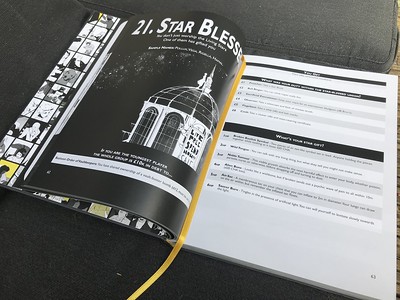 |
| Electric Bastionland - unique and gorgeous! |
TL;DR: Electric Bastionland is a quality roleplaying game with high production values, great art and clean layout. The game engine is simple and could be picked up in a few minutes. The setting is inspiring and interesting and feels unique. There is some really focussed writing and guidance and the game presents a great opportunity for an enjoyable session or mini-campaign. There is a lot packed into the guidance around the game world and I think I'd need to reflect on it further before running it.
Electrical Bastionland is Chris McDowall's successor project to his well-liked 'Into the Odd'. However, I came to it in a cross reference related to Patrick Stuart's Silent Titans which is nominally set in the same world. I must read both of those books properly.
 |
| This a quality book. |
 |
| Black and white with yellow spot colours. |
 |
| Example Failed Career |
The game engine is a very simple d20 mechanic. You have three stats - STRength, DEXterity and CHArisma - rolled initially on 3d6 and you need to make a save by rolling equal to or under the stat. Combat doesn't bother with rolls to hit; you just deal damage. You may make a DEX save if the combat order isn't obvious from the narrative. You start with d6 hit protection. Once these zero, your STR starts getting reduced, and you will need to make saves to avoid a critical which will take you out of combat and kill you if you aren't helped. If you hit 0 hit points you get a scar, which can develop your character. There's a neat pooling mechanic for damage where you don't stack attacks - rather you take the highest roll from the dice rolled by everyone. The core rules are covered in two pages, with a two page example of play.
 |
| Minimalist and focussed. |
The remainder of the book is the Conductor's Guide (GM section) which is incredibly focussed, so much so that I almost find it intimidating. Your first reaction would be to skims this, but you need to take your time and let the ideas settle in. This is definitely a game that is discovered from play. The Conductor (the name change is deliberate to try and give a feel for how McDowall feels the game should work) will start from some very simple maps, mainly built around transport routes, over which are layered landmarks and paths each of which has a complication. Treasures, patrons, specialists, shops and investment opportunities are outlined as ideas in short bullet points.
There are four parts to the world. Bastion itself, the Living Stars above, and the Underworld below. Bastion is surrounded by the Deep Country; failed towns and cities, rural areas, the provinces which are treated with disdain by the city dwellers. Bastion is living, growing and changing, but no-one knows who is in charge. There's a complex interweaving of a multitude of councils which are responsible for all aspects of life, and it is not uncommon for two organisations to both be responsible. The city is filled with people, mockeries (living taxidermies and toys), aliens and machines. Electricity is king. The feel is analogous to the early 20th Century, but later technology could be there in a different form. Oddities include super-science like equipment.
 |
| Going Underground. |
Principles are outlined for running adventures in Bastion and the four other areas, and there are useful random tables to spark ideas. There is guidance on mapping and stocking the Deep Country, Deep Water and the Underground. Principles are given for people, mockeries, machines, aliens and monstrosities. There are example sections of peoples, organisations, boroughs, cults and more. I found these helpful as they drew me into the setting and gave a feel for the author's vision.
The section also outlines McDowall's vision for how the game should work - the ICI doctrine (Information, Choice, Impact). There are some really smart tips for running the game there.
There's no starter adventure. There is no official character sheet (but it's not really that kind of game). I'd have liked to see an example of the map creation.
This is a quality roleplaying game with high production values, great art and clean layout. The game engine is simple and could be picked up in a few minutes. The setting is inspiring and interesting and feels unique. There is some really focussed writing and guidance and the game presents a great opportunity for an enjoyable session or mini-campaign. There is a lot packed into the guidance around the game world and I think I'd need to reflect on it further before running it.
Recommended.
8 May 2020
No comments:
Post a Comment